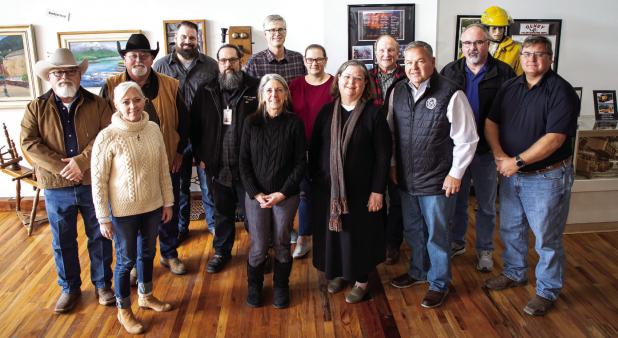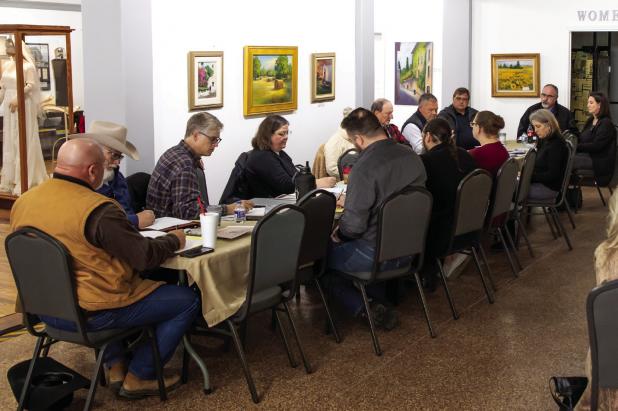

Jack, Young officials gather in Olney for mental health meeting
Young and Jack County leaders met in Olney to define their goals for a workshop in March with state officials, at which they will craft a program designed to plug gaps in mental health services for their rural towns.
The Jan. 25 meeting at the Olney Heritage Museum saw the group discuss ongoing problems finding treatment for mentally ill residents - especially indigent residents, juveniles and jail inmates.
Participants included Young County Precinct 4 Commissioner Jimmy Wiley; Kyle Gullette, Rebecca Spurlock and Andrew Martin of Helen Farabee Centers; Mona Bernhardt, licensed clinic social worker from Olney; Olney Police Chief Dan Birbeck; Young County Sheriff Travis Babcock; Olney City Administrator Arpegea Pagsuberon; Olney Hamilton Hospital Board Chairman Dale Lovett; Jack County Emergency Manager Frank Hefner; Young County Judge Win Graham; Jack County Judge Keith Umphress; Melanie Berry, area representative for Sen. Drew Springer; Karen Craig and Valorie Mahler representing Olney’s Junior Altruistic organization.
Two Olney residents died in 2022 after being released from or refused admission to the inpatient mental health programs in Wichita Falls that serve Young County. About 20 percent of the Young County Jail inmate population needs mental health services and their sometimes violent behavior is running off jail staff, Sheriff Babcock said. Chief Birbeck said Olney police consistently deal with about 200 residents who need mental health support.
Judge Umphress proposed a four-part plan based on input from the committee’s December meeting. The plan would include preventive measures to keep mentally ill people out of the criminal justice system, treatment for those in the system, a bridge program for Helen Farabee and others to supervise mentally ill people as they re-enter communities and workplaces, and support from Texas Workforce Solutions to provide jobs.
Sheriff Babcock and Judge Umphress have worked out a tentative plan to send inmates from Young County who need ongoing mental health treatment to the Jack County Jail, which has contracted with a local hospital to bring psychiatric services to inmates. “That’s the only solution I see,” Sheriff Babcock said. “We have orders from the judge to be sent to see if [the inmates] are competent to stand trial and we can’t get them in [for treatment] for 12 months or longer. I want to see how we can use Jack County’s Jail to house these patients.”
The group also discussed how to keep people with mental illnesses from winding up in jail when they cannot access medications and therapy or are self-medicating with drugs and alcohol. Chief Birbeck suggested that the counties form teams consisting of a social worker, a police officer, and a paramedic to regularly visit at-risk residents to make sure they are following treatment plans. Chief Birbeck created a similar program during his tenure at Parkland Memorial Hospital in Dallas County.
“That’s a program that we launched in Dallas and would be good to see it here … through a memorandum of understanding between these counties,” Chief Birbeck said The committee heard from Helen Farabee Centers, which contracts with the State of Texas to provide mental health treatment to 19 counties including Jack and Young, about a similar program the Centers are helping Wichita Falls Police Department implement with state help.
“That’s a good concept,” Mr. Martin of Helen Farabee told the group. “It’s a proven model with lots of research behind [it]. It takes a lot of effort and there is no money. We have been building a data set for over a year trying to get some numbers so if we put a team together like that on the ground supported by a grant we would have some of that data behind it that [state mental health officials] are going to want to see.”
Judge Umphress and Judge Graham reviewed the bench powers they can use to ensure that conditions of release for mentall ill patients from custody include mental health treatment, when appropriate.
Dale Lovett, board chairman of the Olney Hamilton Hospital, said hospital staff has begun discussing protocols for treating acutely mentally ill patients brought in by law enforcement.
The group meets next on March 2-3 at the Patriot Ranch in Decatur, Texas for a workshop held by the Texas Judicial Commission on Mental Health. During the SIM (Sequential Intercept Model) workshop, the committee will work with state mental health officials to assess available resources, determine gaps in services, and plan for community change.
